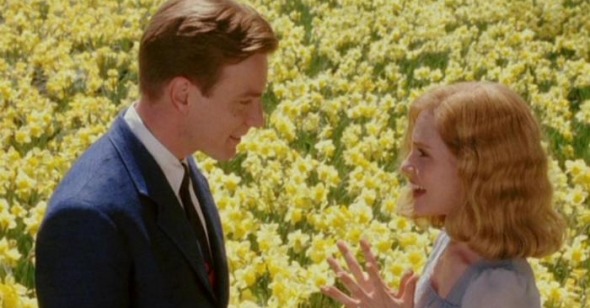Child’s Play
by Eric Hynes
Big Fish
Dir. Tim Burton, U.S., Columbia Pictures
Like the absurdly giant fish that lumbers through the water in the opening sequence—a CGI creation meant to evoke a rubbery, low-tech effect—Tim Burton’s latest film, Big Fish, seems burdened by contrasting demands. There are whiffs of traditional Burtonesqueries: sympathetic monsters, angel-faced devils—miniature reminders of his Addams family values. Yet there’s also the pull of Oscar-caliber credibility—signs of the forty-something fantasist’s reformation abound in the inflated imagery and emotional puppeteering borrowed from “serious” features great and small. Burton struggles to balance these forces, but Big Fish just feels forced.
The overarching thematic concern here is of father-son reconciliation, and though the film arrives too late for the 2002 father-child sweepstakes (Catch Me if You Can, Road to Perdition, Minority Report, City by the Sea, Signs, Gangs of New York), there are some scenes of genuine anger and regret that justify the trope’s recall. Edward Bloom (Albert Finney) is an ailing raconteur whose tall tales endear him to everyone but his suspicious son, Will (Billy Crudup), a journalist (read: literalist) who hears evasions in his father’s embellishments, and lies in his personal mythology. The central lie/myth, involves the titular fish, supposedly caught, on the day of Will’s birth. Will’s return from a three-year estrangement is predicated on summoning the/a true story. Before Will (or we) get to the bottom of anything, however, we’re treated to a series of tall tales, some self-contained, some tangental, that exasperate the adult Will but enthralled him as a boy. We’re meant to hear them as he once did: as hero stories, lovingly told, starring his own father (played in his younger years by Ewan McGregor).
For the viewer, a tension is created between our empathy with the frustrated Will, whose desire to come to terms, unimaginatively expressed as it is, seems justified—and our expected delight in the creative pluck of his father’s imagination. Screen time, soundtrack, and the enamored attentions of Ed’s wife and daughter-in-law (Jessica Lange and Marion Cotillard—fine actresses with literally nothing to do but sit and listen) stack the deck against Will, but Crudup, for the betterment of the film (though perhaps counter to the intent of the script), outweighs them all. Though his dialogue is often ham-fisted and he’s given few opportunities to move through space, he uses what’s available to create the only human portrait in the film. While the story lumbers from spectacle to spectacle without an ear for rhythm or a sense of dramatic or comic affect, Crudup’s silent expressions of ambivalence and hope, and one fine but very short scene of Finney and Lange fully clothed in a bathtub, are moments that signal real lives, and real time, overlooked—Big Fish obscures its own small delights.
There are broad-stroked pleasures to be had, such as Steve Buscemi’s recurring turn as a poet turned bank robber turned Wall Street power broker, but too much is familiar. And too much of what is familiar seems lifted from other films preoccupied with the great American small southern town of the 1950s, particularly Forrest Gump. Like its predecessor, this yarn gets told in drawled voice-over. There’s a fish tale. And there’s the war story. The changing hairstyles, the classic cars, the fifties-cum-sixties pop songs, and the aphorisms: “It’s rude to talk about religion—you never know who you’re going to offend.” Burton doesn’t seem to have the mind or the taste for politics, but by inertly retracing the steps of that reactionary valentine to unthinking citizenship, Burton calls attention to his own dormant conservatism. Nostalgia—the Achilles heel for overgrown children everywhere—sneaks in like the Disney at the bottom of Burton’s resume. The southern gothic in Big Fish is big, green-lawned, and white-picket fenced all over. Spectre, Alabama, one of McGregor’s stopovers, is too green, white and perfect for his restless soul, but when he returns decades later to find it brown and suffering, he secures investors and gentrifies the place to look even more idyllic than before. For the first visit, Burton makes the town slightly creepy—think Disney’s Celebration Village—which well serves Ed’s, and our, uneasiness with “perfection”. After some sprucing up, the reclamation of Spectre town recalls Disney’s Main Street, USA—its storefronts can’t possibly sell anything but souvenirs. Considering the triumphal treatment Ed’s makeover gets, the lingering creepiness is unintentional.
Numerous sketches in Big Fish evoke the gently dark naughtiness of Roald Dahl’s stories for children—the big friendly giant, the evil-eyed witch, the hairy trees; indeed, his next picture, a second adaptation of Dahl’s Charlie and the Chocolate Factory will no doubt be yet another artifact, like Sleepy Hollow and Planet of the Apes, of Burton’s own childhood fandom. Burton, like Dahl, understands the dark fantasies of children, and dwells there, marking them as first flurries of inspiration, identity, and decency. To approach Burton as an auteur, for he certainly does himself, this preoccupation unifies much of his output. From Pee-Wee to Winona Ryder’s calendar goth in Beetlejuice, Bruce Wayne playing dress-up to salve his childhood tragedy, the tender Edward Scissorhands, the Penguin’s revenge on those who laughed and called him names, the gleefully naive Ed Wood, and nubiles Natalie Portman and Lukas Haas as the last people standing in Mars Attacks!—Burton’s films project from red adolescent hearts darkly shrouded. Though a disappointment, Big Fish at least questions this preoccupation, and offers more than a child’s view of childhood.
